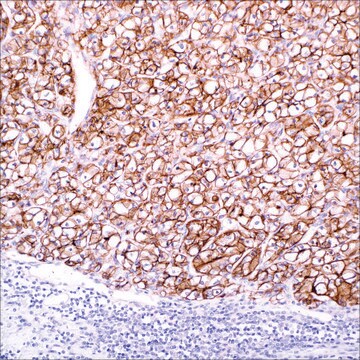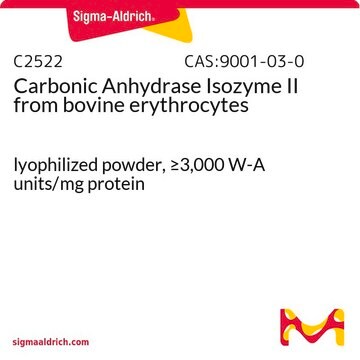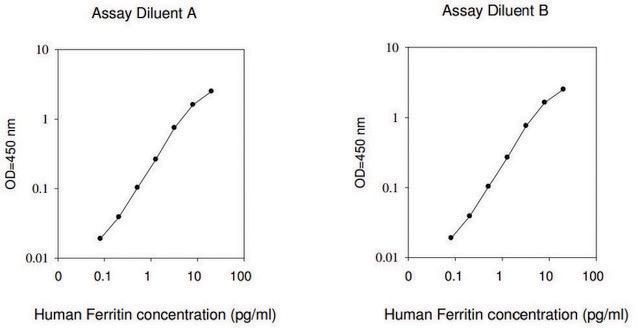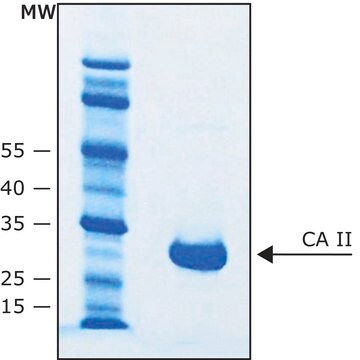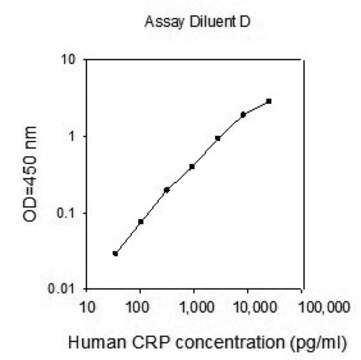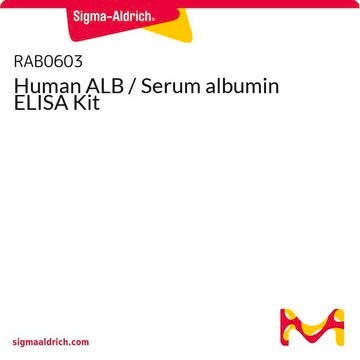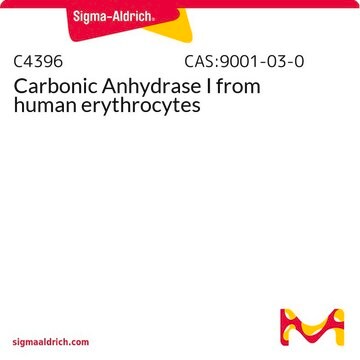RAB0036
Human Carbonic Anhydrase IX ELISA Kit
for serum, plasma, cell culture supernatant and urine
Synonym(s):
CA9
Sign Into View Organizational & Contract Pricing
All Photos(2)
About This Item
UNSPSC Code:
41116158
NACRES:
NA.32
Recommended Products
species reactivity
human
packaging
kit of 96 wells (12 strips x 8 wells)
technique(s)
ELISA: suitable
capture ELISA: suitable
input
sample type plasma
sample type serum
sample type cell culture supernatant(s)
sample type urine
assay range
inter-assay cv: <12%
intra-assay cv: <10%
sensitivity: 0.2 pg/mL
standard curve range: 0.205-50 pg/mL
detection method
colorimetric
shipped in
wet ice
storage temp.
−20°C
Gene Information
human ... CA9(768)
General description
Carbonic anhydrase IX (CA9) belongs to the zinc-containing metalloenzymes family. The protein is encoded by the gene mapped to human chromosome 9p. The encoded protein is localized on cell membrane and is characterized with an N-terminal proteoglycan-like domain (PG), a CA catalytic domain (CA), a transmembrane helical segment and a short intra-cytoplasmic tail. CA9 is expressed at very low levels in normal tissues (mostly in gastrointestinal tract), but it is expressed at high level in various cancer tissues, such as renal, lung, cervical, ovarian, esophageal and breast cancer.
The Human CA-IX (Carbonic Anhydrase IX) ELISA (Enzyme-Linked Immunosorbent Assay) kit is an in vitro enzyme-linked immunosorbent assay for the quantitative measurement of human CA-IX in serum, plasma, cell culture supernatants and urine.
Immunogen
Recombinant Human CA9
Application
For research use only. Not for use in diagnostic procedures.
Please refer to the attached General ELISA KIT Procedure (sandwich, competitive & Indirect ELISA)
Please refer to the attached General ELISA KIT Procedure (sandwich, competitive & Indirect ELISA)
Biochem/physiol Actions
Carbonic anhydrase IX (CA9) aids in reversible hydration of carbon dioxide to carbonic acid and bicarbonate. CA9 functions as a promising biomarker for diagnosing clear cell renal cell carcinoma (ccRCC), tumor hypoxia and prostate cancer (PC). In addition to pH control, CA9 also plays a vital role in cell proliferation, adhesion and tumor invasion.
Other Notes
A sample Certificate of Analysis is available for this product.
Please type the word sample in the text box provided for lot number.
Please type the word sample in the text box provided for lot number.
Kit Components Also Available Separately
Product No.
Description
SDS
Signal Word
Warning
Hazard Statements
Precautionary Statements
Hazard Classifications
Met. Corr. 1
Storage Class Code
8A - Combustible corrosive hazardous materials
Choose from one of the most recent versions:
Already Own This Product?
Find documentation for the products that you have recently purchased in the Document Library.
Biochemical characterization of CA IX, one of the most active carbonic anhydrase isozymes.
Hilvo M
The Journal of Biological Chemistry, 283(41), 27799-27809 (2008)
D S Pisetsky et al.
Cytokine, 69(1), 110-115 (2014-07-16)
Anorexia nervosa (AN) is a serious, potentially life-threatening disorder characterized by severe weight loss, dysregulated eating, and often excessive exercise. While psychiatric illnesses such as depression are associated with increased levels of pro-inflammatory mediators, evidence for such disturbances in patients
CA9 as a biomarker in preoperative biopsy of small solid renal masses for diagnosis of clear cell renal cell carcinoma.
Li G
Biomarkers, 22(2), 123-126 (2017)
Chromosome 9p deletions identify an aggressive phenotype of clear cell renal cell carcinoma.
La Rochelle J
Cancer, 116(20), 4696-4702 (2010)
J E Lake et al.
HIV medicine, 15(7), 431-441 (2014-02-11)
Soluble CD14 (sCD14) is a monocyte activation marker associated with increased mortality in HIV infection. We assessed 48-week changes in sCD14 and other inflammatory biomarkers in virologically suppressed, HIV-infected women switching to raltegravir (RAL) from a protease inhibitor (PI) or
Our team of scientists has experience in all areas of research including Life Science, Material Science, Chemical Synthesis, Chromatography, Analytical and many others.
Contact Technical Service